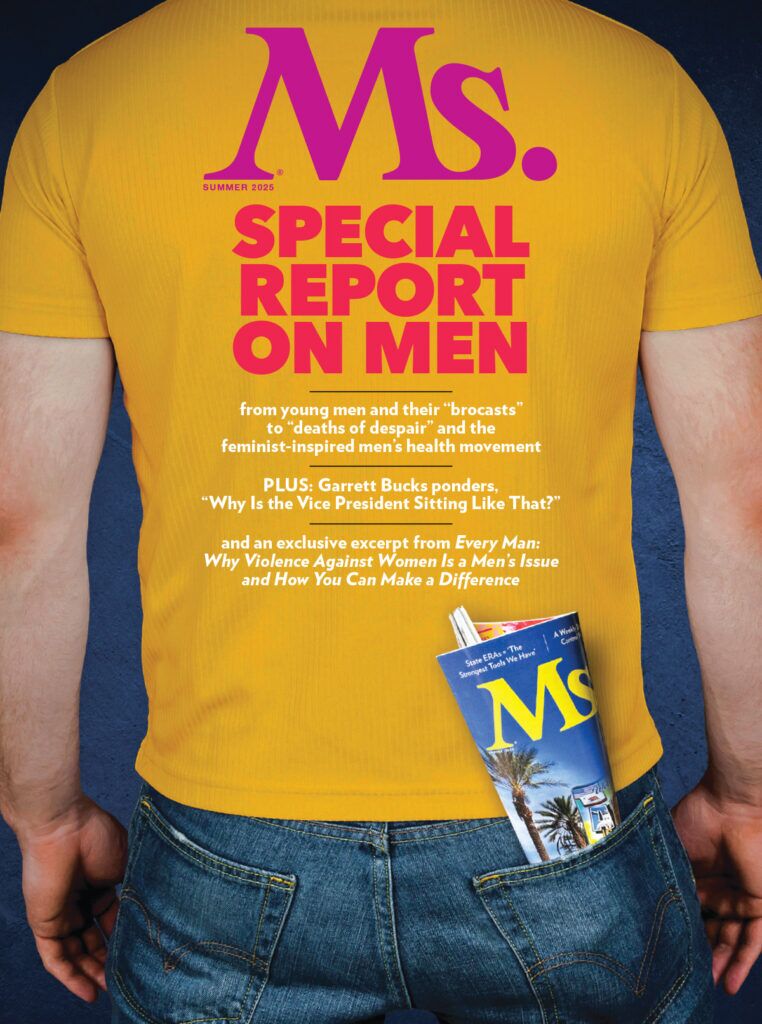Behind JD Vance’s awkward posture is a self-defeating message to young men. Writer and organizer Garrett Bucks offers some real talk instead.
For the past year, I have spent dozens of hours watching JD Vance take up far too much space in a chair. And as I’ve come to learn, the vice president’s preferred sitting position is cartoonishly wide-legged, as if he were not seated for an interview but instead commandeering an elephant. It’s an unsparingly crotch-centric stance and makes the VP’s pants ride up in the manner of an old-timey French boy donning culottes. For a political figure of his rank, it’s strange.
The reason why I’ve had so many occasions to wonder “Why is the vice president sitting like that?” is that in the three-headed Cerberus that is the second MAGA administration, Donald Trump is the figurehead, Elon Musk is the chaos agent, and JD Vance is the smarty-pants debate kid.

After being named Trump’s running mate last summer, Vance went on a nonstop media tour with traditional outlets as well as with “manosphere” podcasters like Joe Rogan, Theo Von and the Nelk Boys. He did so not just to promote the current administration’s policies, but to position himself as a key agent in the post-Trump conservative movement.
Unlike his famously mercurial boss, Vance is a disciplined communicator. He recognizes that the worldview he’s promoting—one honed alongside the venture capitalist and democracy-skeptic Peter Thiel—remains unpopular. Vance has to build a base for his brand of patriarchal Catholic nationalism from scratch, and what better source of acolytes than a group who was promised a position at the top of American social hierarchies, but who now feels that privilege slipping away.
That awkward posture isn’t accidental. When Vance spreads his legs and plops down for an interview, he is directly addressing young men. He wants to prove that he’s just one of the guys, while also issuing a dire warning. “The boys,” he asserts, are under attack.
This is not new territory, of course. In a sense, we have been talking about a “war against boys” for my entire adult lifetime. The term dates back at least to 2000, when Christina Hoff Sommers published an influential philippic on the subject. More broadly, though, as Susan Faludi documented in Backlash: The Undeclared War Against American Women, advancements in women’s rights have always been followed by countermovements, each one lamenting, “But what about the boys?”
When Vance spreads his legs and plops down for an interview, he is directly addressing young men. He wants to prove that he’s just one of the guys, while also issuing a dire warning. ‘The boys,’ he asserts, are under attack.

One particularly illustrative example of Vance’s version of the war against boys pitch came during his appearance at the Conservative Political Action Conference in February 2025. When it came time for the vice president to address the issues facing boys and men on that stage, he didn’t raise the kinds of concerns that you’d hear from serious scholars on the topic, like Ruth Whippman and Richard V. Reeves. He didn’t discuss male suicide rates or the economic struggles of working-class men. He didn’t talk about what the ongoing crisis of gendered violence by cis men against women reveals about patriarchy.
Instead, he kept talking about how guys aren’t allowed to tell jokes with their buddies anymore.
His legs spread wide, the second most powerful man in America addressed a nation of young men:
“Don’t allow this broken culture to send you a message that you’re a bad person because you are a man, because you like to tell a joke, because you like to have a beer with your friends or because you’re competitive.”
In case the “tell a joke” part escaped notice, Vance looped back to put a finer point on it:
“When I think about ‘What is the essence of masculinity?’—You could answer this in so many different ways, but when I think about me and my guy friends, we really like to tell jokes to one another. We like to laugh. … I think this is why young men in particular are so inspired by President Trump. … He doesn’t allow the media to tell him he can’t make a joke or he can’t have an original thought. [He] just says what’s on his mind. … It’s a good example to set for young men in American culture.”
We’ll set aside, for a moment, an alternate reality in which a less sycophantic moderator posed a few basic follow-up questions. (“Who is preventing young men from telling jokes, Mr. Vice President?” “What about their masculinity is being threatened by their inability to tell those jokes?”)
The subtext here is that it’s not just any jokes that separate real guys from the gendered rabble. It’s the ability to tell offensive jokes. The implication: Real men are jerks. If you take away our chance to sound like the hackiest guy at the Chuckle Hut in 1987, what is left of us?
Across political lines, men report being lonely but are locked into a specific set of patterns that only make the issue worse.
The irony of this moment is that Vance and others who claim to care about male loneliness and purposelessness are offering the exact opposite of what might be helpful.
Young men, like all Americans, aren’t wrong for feeling isolated and disconnected. If there’s one thing we all share—across identity and ideology— it’s that the world, at present, often leaves us feeling deeply empty. The loneliness epidemic is both real and, I’d argue, a natural outgrowth of America’s culture of individualism. The specific tragedy of young men isn’t that they’re the only ones who are lonely, but that the salve they’re offered for their loneliness will only continue to hurt both them and the rest of us.
Instead of proposing actual spaces of belonging, young men are teased by opportunities to get ripped off by crypto scams and sports betting. They’re warned that if they don’t make the cruelest joke, somebody will heave one their way. For God’s sake, they have to listen to JD Vance tell them that “a broken culture” hates them and that only people like him and Donald Trump can save them. No wonder they feel isolated.
But in reality, the cure for loneliness can’t be found in calling your friends the f-word or finding a “trad wife” who will stay in her place. It requires genuine relationships. It’s about having your feelings valued but with the equal expectation of emotional reciprocity. Behold and be held. That’s the deal.
Now, it’s phenomenally easy for me to look at Vance and his ilk and opine about the bankruptcy of their offerings. But it’s not just MAGA guys who have internalized the message that men can float through life on their own hero’s journey. I wrote a whole book about being a white guy who spent half a lifetime cultivating an impeccable collection of loudly stated political opinions, not realizing that all that spouting off about my feminism and my anti-racism was much more in service of my ego than the common good. It took me an embarrassingly long time to realize a simple tautology: If I claimed to care about other people, then I had to spend significantly more time actually caring for other people.
Once I noticed this problem in myself, I increasingly saw it everywhere.
Earlier this year, I taught a set of online classes on how to build community in this fraught political moment. They were the most popular classes I’ve ever offered, which speaks to how many of us are craving connection right now. There is, however, a clear trend in who has and hasn’t gravitated toward classes about community building. Of the nearly 700 registrants at the time of writing this, only 50 identified as men (which, presumably, means that even fewer are cis men).
To be clear, I’m sure that I could be doing more to encourage guys to join my trainings. No doubt, there are more than 50 men who are interested in strengthening webs of interdependence. However, I suspect that there’s more going on here than my strengths or weaknesses as a man-marketer.
The problem isn’t just that I need to whip up a black logo with Gothic font and add a tagline like “knowing your neighbors will give you a six-pack.” I’m already aware of the existence of “the boys” in left-leaning political circles. They’re overrepresented in those spaces where they get to offer their own pristine opinions and, ideally, be rewarded with leadership roles for doing so.
Across the country, it’s not atypical for Democratic Socialists of America groups to struggle with the opposite issue as my community class. Over the past few years, multiple DSA chapters, upon noticing that they risked merely becoming a space for guys to debate about rather than build a political movement, have struggled openly with the question of “How do we de-dude socialism?”
These may be anecdotal examples, but the trend line is clear. Across political lines, men report being lonely but are locked into a specific set of patterns that only make the issue worse. We want to be charismatic heroes or joke-making rebels but not humble neighbors. We’re less likely to raise our hand when the task is tending to a space where others feel welcomed. We show up when we get to have our opinions validated but stay home when it’s time to care for others.
I’ve gotten to experience the gift of community because I’ve invested in shared spaces over the long term, even when I’ve been exhausted, annoyed and unsure whether it would all pay off.
Speaking personally again, I don’t pretend to have ascended to a higher level of community-centric consciousness. In some ways, I’m decent at caring for the emotional and practical needs of those around me, but I still drop the ball all the time.
What I will say is that for the past few years, I’ve charged myself with caring less about being right and more about being in love, spending less time clamoring for recognition and more time recognizing the web of humanity around me. In that time, I’ve been less lonely than at any other stage in my life. I’ve had friends show up for me because I’ve shown up for them. I’ve gotten to experience the gift of community because I’ve invested in shared spaces over the long term, even when I’ve been exhausted, annoyed and unsure whether it would all pay off. I’ve attended more memorial services, celebrated more births and weddings, witnessed more divorces and gender transitions than I ever imagined possible. I’ve had more people cry to me and with me.
I’ve discovered, in practice, that the reason why I was lonely wasn’t due to some cultural inevitability. Contrary to Vance, it definitely wasn’t because feminism or anti-racism had poisoned the ground for me as a white guy. It was because you can’t reap what you don’t sow. The cure for loneliness isn’t to stomp your feet and yell about how you should be allowed to do and say whatever you want, consequences be damned. It’s to be interested in other people beyond what they can do for you.
I’m admittedly not much of a guy whisperer. I’m admittedly pretty skeptical that there is a single way to address men. But if JD Vance gets to make his pitch to guys, then I can at least give it a shot myself. Here’s my real-talk message to young, straight, cis men. Imagine it in a black Gothic font, if you will.
Guys: You all, like all people, deserve to be loved. The problem is, the messengers who claim to be your friends are lying. If you take their advice—if you believe that your path is merely to be the tough guy, the hero, to tell the dumb joke, to not give a crap about what anybody thinks about you—your life is going to be so much emptier. Sure, you will find men who validate that worldview on the internet or a TV screen. But those guys don’t love you. They love their power over you. And it doesn’t matter how cruel you are, or how far you puff out your chest.
The more you pretend that your life isn’t entwined with all of ours, the more that myth becomes truth. You can rip off whatever playground insults you want and call it humor, but if that’s the sum total of your life’s aspiration, the real joke’s on you.
This article appears in the Summer 2025 issue of Ms. Join the Ms. community today and you’ll get issues delivered straight to your mailbox—or order a single copy of the Summer issue as a standalone for just $5.
Great Job Garrett Bucks & the Team @ Ms. Magazine Source link for sharing this story.





